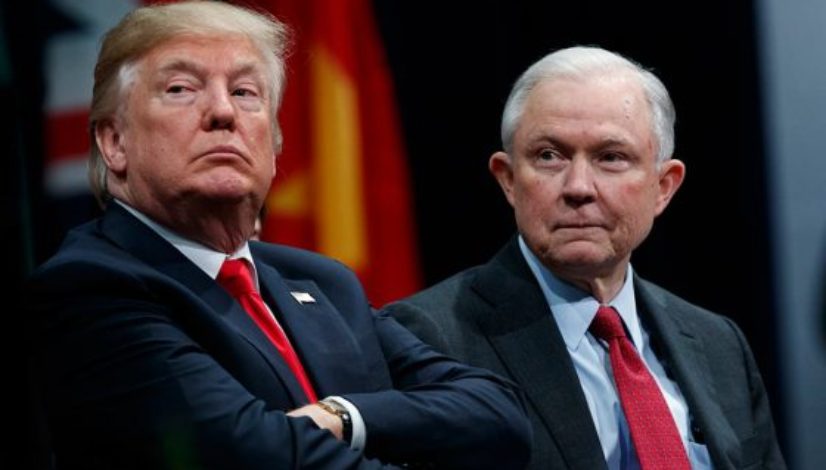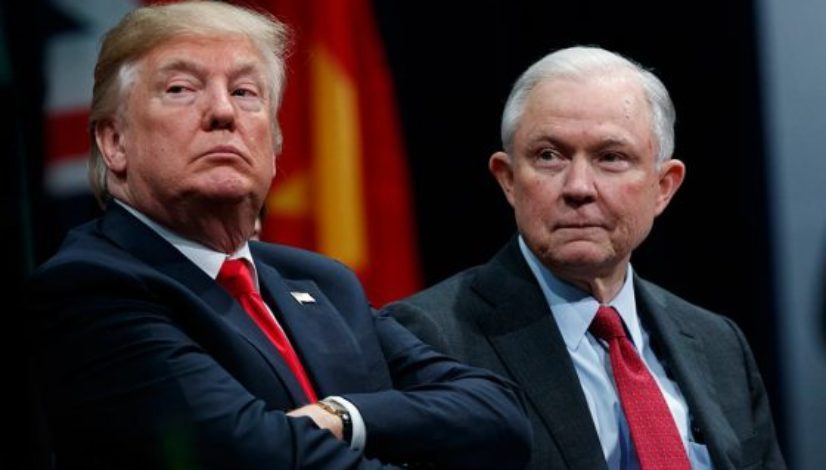Trump is backing off the marijuana fight. Jeff Sessions has not.

WASHINGTON — Marijuana has enjoyed some head winds lately, even as regulating it faces an uncertain future in the Trump administration.
Over the past week, Trump promised not to go after marijuana suppliers and users who are obeying their state laws, former House speaker John Boehner, R-Ohio, announced his formerly icy views toward the drug have thawed, and top Senate Republican Mitch McConnell pushed harder for legalizing the farming of hemp, pot’s non-psychoactive relative.
Marijuana legalization advocates say they’re cheered by the recent developments — and particularly by the president’s statements last week, which provided some clarity into how aggressively his Justice Department might go after states that have defied the federal prohibition on marijuana use.
“This news should make states more comfortable implementing their legalization programs,” said Don Murphy, director of conservative outreach for the Marijuana Policy Project, a group that advocates for removing criminal penalties for pot use. “It should also serve as a rallying cry for lawmakers to pass comprehensive legislation that leaves marijuana policy to the states permanently.”
In January, Attorney General Jeff Sessions set his sights on the several dozen states where medical or recreational marijuana is legal, announcing federal prosecutors can decide for themselves whether to press cases against growers, sellers or users for violating federal law. The posture outraged lawmakers whose states have legalized marijuana, including Sen. Cory Gardner, R-Colo., who swore to block Trump’s Justice Department nominees in retribution.
But Gardner has backed down, saying Trump promised him that despite the Sessions memo, federal prosecutors would not target the marijuana industry in Colorado. The president’s assurances to Gardner directly contradict Sessions’ posture, revealing yet another rift between Trump and members of his administration.
“Since the campaign, President Trump has consistently supported states’ rights to decide for themselves how best to approach marijuana,” Gardner said in a statement.
Op-ed: What to make of Cory Gardner’s feud with Jeff Sessions
Rep. Earl Blumenauer, D-Ore., co-founder of the Congressional Cannabis Caucus, called it a “head-spinning moment.”
“We should hope for the best, but not take anything for granted,” he said. “Trump changes his mind constantly, and Republican leadership is still in our way.”
It’s true that revising the federal ban on marijuana isn’t on Congress’s horizon – at least not yet. But the House and Senate are filled with an unprecedented number of pro-pot lawmakers from a record number of states where the marijuana industry is legal. And there are glimmers that GOP leaders, past and present, are softening on marijuana sale and use, as well as the products related to it.
McConnell has supported hemp cultivation for at least four years – in 2014, he backed a provision in the farm bill to permit a hemp cultivation pilot program in his home state of Kentucky. Now he is the lead sponsor of a bill removing hemp from the federal government’s schedule of controlled substances, enthusiastically rolling out the measure on the Senate floor last week.
“As the tobacco industry has changed, some farmers in states like Kentucky have been searching for a new crop that can support their families and grow our agricultural economy,” McConnell said. “And many believe they’ve found such a product: Industrial hemp. But the federal government has stood in the way. Mr. President, it’s time to change that.”
And Boehner, who once said he was “unalterably opposed” to decriminalizing marijuana use, announced last week that he had joined the board of directors of Acreage Holdings, a company that grows and sells the drug in 11 states.
Boehner had said in 2011 that he was worried legalizing marijuana would result in increased abuse of a variety of drugs, including alcohol, but wrote last week that he has changed his mind because of the promise pot holds for medical treatment for veterans.
“I have concluded descheduling the drug is needed so that we can do research and allow VA to offer it as a treatment option in the fight against the opioid epidemic that is ravaging our communities,” he wrote.




